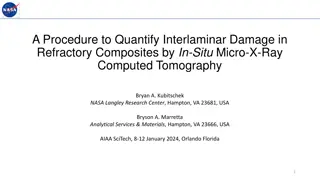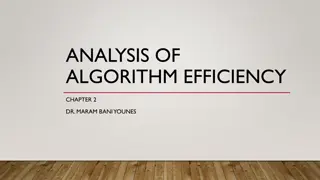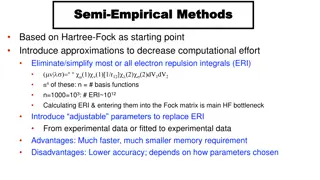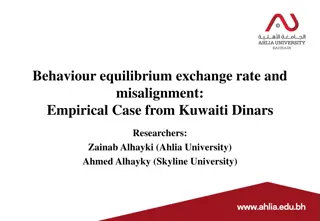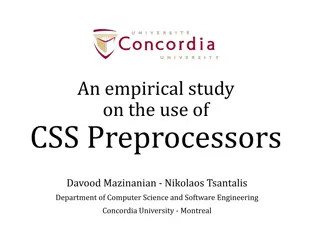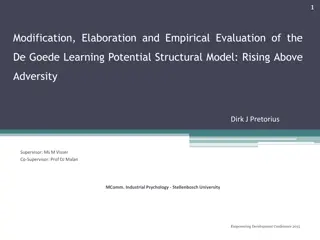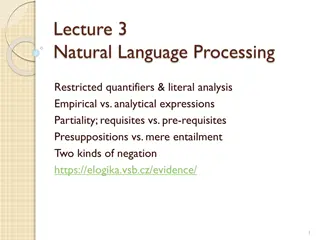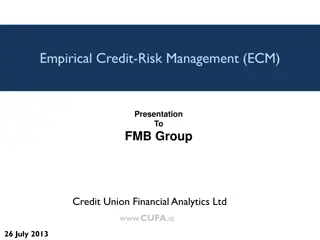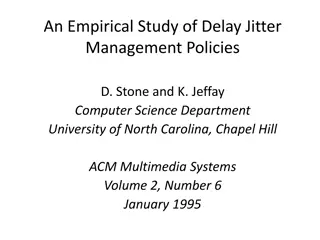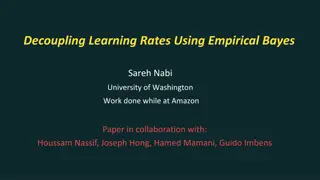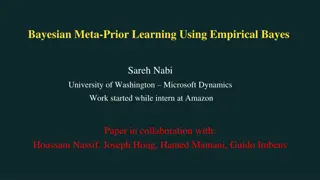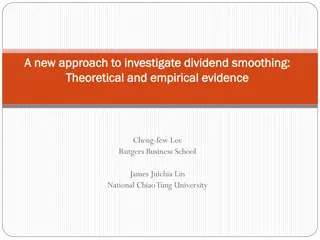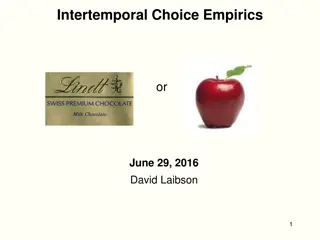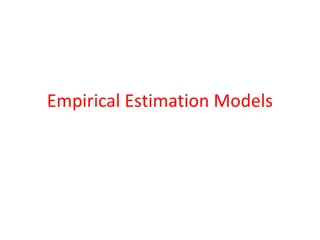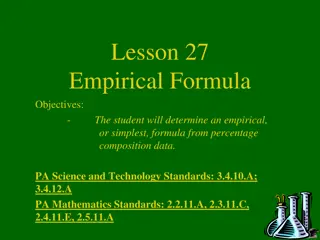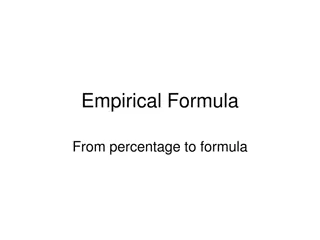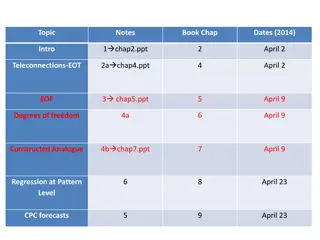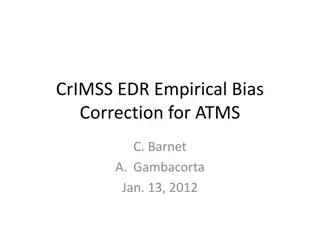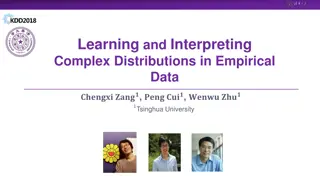Procedure for Quantifying Interlaminar Damage in Refractory Composites Using Micro-X-Ray CT
This study presents a method to quantify interlaminar damage in refractory composites through in-situ micro-X-ray computed tomography. The procedure aims to capture the progressive failure in ASTM-sized specimens, providing empirical data for improving simulations of composite materials. Various spe
6 views • 19 slides
Algorithm Efficiency Analysis
In this chapter, Dr. Maram Bani Younes delves into the analysis of algorithm efficiency, focusing on aspects such as order of growth, best case scenarios, and empirical analysis of time efficiency. The dimensions of generality, simplicity, time efficiency, and space efficiency are explored, with a d
2 views • 28 slides
Overview of Semi-Empirical Methods Based on Hartree-Fock
Semi-empirical methods derived from Hartree-Fock theory aim to reduce computational effort by approximating or eliminating electron repulsion integrals. Strategies include introducing adjustable parameters to replace ERI calculations and utilizing zero differential overlap methods like CNDO, INDO, N
5 views • 11 slides
Parallel Implementation of Multivariate Empirical Mode Decomposition on GPU
Empirical Mode Decomposition (EMD) is a signal processing technique used for separating different oscillation modes in a time series signal. This paper explores the parallel implementation of Multivariate Empirical Mode Decomposition (MEMD) on GPU, discussing numerical steps, implementation details,
2 views • 15 slides
Empirical Research on Surrogacy in New Zealand: Key Findings
Associate Professor Debra Wilson from the University of Canterbury in New Zealand conducted empirical research on public opinions regarding surrogacy. The findings revealed three surprising results, including perspectives on surrogates being compensated, the importance of genetics in surrogacy arran
0 views • 11 slides
Generalization of Empirical Risk Minimization in Stochastic Convex Optimization by Vitaly Feldman
This study delves into the generalization of Empirical Risk Minimization (ERM) in stochastic convex optimization, focusing on minimizing true objective functions while considering generalization errors. It explores the application of ERM in machine learning and statistics, particularly in supervised
2 views • 11 slides
Empirical Analysis of Kuwaiti Dinar Exchange Rate Behavior and Misalignment
This research focuses on studying the behavior of the real equilibrium exchange rate (REER) of Kuwaiti Dinars, estimating the equilibrium exchange rate using the BEER model, and calculating real exchange misalignments (RERM). It delves into the impact of exchange rate fluctuations on macroeconomic v
4 views • 15 slides
History of Chemotherapy: From Empirical Use to Modern Era
The history of chemotherapy is divided into three phases, starting from the empirical use of compounds in ancient times to the modern era marked by targeted drug development. Ehrlich's pioneering work in the late 19th to early 20th centuries laid the foundation for understanding the selective toxici
0 views • 15 slides
Empirical Study on CSS Preprocessors: Insights and Findings
Exploring the utilization of CSS preprocessors in web development through an empirical study conducted by Davood Mazinanian and Nikolaos Tsantalis from Concordia University. The study delves into the motivations behind using CSS preprocessors, developers' preferences, features offered by preprocesso
1 views • 24 slides
Empirical Evaluation of De Goede Learning Potential Model
This research paper focuses on the modification and extension of the De Goede Learning Potential Structural Model, aiming to identify non-cognitive variables influencing learning potential. Through model development, hypothesis testing, and empirical evaluation, the study explores factors such as In
1 views • 12 slides
Empirical vs Analytical Expressions in Natural Language Processing
Restricted quantifiers and literal analysis in natural language processing reveal the distinctions between empirical and analytical expressions. While empirical expressions refer to non-trivial intensions that require empirical investigation, analytical expressions denote constant intensions that ca
1 views • 19 slides
Empirical Credit Risk Management at FMB Group Credit Union
Empirical Credit-Risk Management (ECM) presentation to FMB Group Credit Union by Financial Analytics Ltd discusses the background, traditional forecasting methods, income and risk recognition, provisioning approaches, and benefits for credit unions. ECM offers expert retail credit risk management th
1 views • 25 slides
Impact of ZLECAf in North Africa: Empirical Evaluation
The Economist, Aziz Jaid, from the CEA Bureau for North Africa conducted an empirical evaluation on the impact of the ZLECAf in North Africa, focusing on goods. The context includes coverage of seven countries, the rationale behind the ZLECAf agreement, and details on the liberalization scenarios an
0 views • 13 slides
An Empirical Study of Delay Jitter Management Policies
This study explores delay jitter management policies to support interactive audio over LANs, focusing on display queue management to minimize gaps in playout. The paper evaluates different queue management policies, including I-policy and E-policy, along with queue monitoring in the context of an em
1 views • 37 slides
Decoupling Learning Rates Using Empirical Bayes: Optimization Strategy
Decoupling learning rates through an Empirical Bayes approach to optimize model convergence: prioritizing first-order features over second-order features improves convergence speed and efficiency. A detailed study on the impact of observation rates on different feature orders and the benefits of seq
1 views • 25 slides
Bayesian Meta-Prior Learning Using Empirical Bayes: A Framework for Sequential Decision Making Under Uncertainty
Explore the innovative framework proposed by Sareh Nabi at the University of Washington for Bayesian meta-prior learning using empirical Bayes. The framework aims to optimize ad layout and classification problems efficiently by decoupling learning rates of model parameters. Learn about the Multi-Arm
1 views • 27 slides
Investigating Dividend Smoothing: Theoretical & Empirical Analysis
Dividend smoothing behavior in corporate finance is investigated through the partial adjustment and information content hypotheses. A new integrated model is proposed to evaluate dividend smoothing behaviors, contributing to a deeper understanding of firm tendencies to smooth dividends. Empirical ev
0 views • 21 slides
The Interplay Between Theoretical Psychology and Empirical Research
Exploring the potential for collaboration between philosophy, theoretical psychology, and empirical research, this article delves into the historical divide, recent renaissance, and avenues for mutual enrichment. It raises questions about how each discipline can contribute to and benefit from the ot
1 views • 16 slides
Empirical Formulation for Ice Crystal Fragmentation by Sublimation Breakup Study
This study by Akash Deshmukh at Lund University delves into the empirical formulation for the number of ice crystal fragments resulting from sublimation breakup. It discusses secondary ice production mechanisms, challenges in numerical formulation, observational bases, previous studies, and cloud de
0 views • 7 slides
Spatial Externalities of Technological Innovation and Economic Growth: Empirical Study
This study explores the spatial externalities of technological innovation and economic growth, focusing on the convergence of growth rates in different regions. It delves into the impact of knowledge capital, patents, human capital, and internet development on regional growth rates. Various theories
0 views • 26 slides
Empirical Studies on Intertemporal Choice by David Laibson
This collection of empirical studies explores intertemporal choice behavior, focusing on preference reversals, commitment, and other related concepts. The studies reveal how individuals exhibit time-inconsistent preferences when making decisions about future and present outcomes, showcasing examples
0 views • 49 slides
Estimation Models in Software Development
Empirical Estimation Models like COCOMO and Constructive Cost Model play a crucial role in estimating software project efforts based on various factors such as lines of code (LOC) and function points (FP). These models provide a structured approach to predict project duration, effort, and team size.
0 views • 14 slides
Empirical Formula Determination from Percentage Composition Data
This content explains how to determine the empirical formula of a compound from percentage composition data by converting percentages to moles and finding the smallest whole number ratios. Detailed steps, examples, and special cases are included.
0 views • 6 slides
Determining Empirical Formula from Percentage Data
In Lesson 27, students will learn to derive the empirical formula from percentage composition data. This practical skill is vital in science and technology fields. By analyzing the composition of a substance, learners will uncover its simplest formula. This lesson aligns with PA Science and Technolo
0 views • 16 slides
Evaluating the Empirical Performance of Sandwich Learned Bloom Filter and Adaptive Learned Bloom Filter
This study delves into the performance evaluation of Standard Bloom Filter, Sandwiched Learned Bloom Filter, and Adaptive Learned Bloom Filter. The research explores trade-offs, false positive rates, memory efficiency, and implementation methods, presenting empirical results and comparisons between
0 views • 13 slides
Empirical Formula
How to determine empirical formulas from percentage compositions involves converting percentages to grams, then to moles, and finding the lowest whole number ratio of elements to derive the empirical formula. This process is exemplified with step-by-step calculations for compound compositions contai
0 views • 21 slides
Molecular Formulas: Empirical vs. Molecular, Calculations Explained
The difference between empirical and molecular formulas, how they are determined experimentally, and examples of compounds with different formulas. Learn how to calculate molecular formulas from empirical data and molecular weight, with step-by-step explanations and illustrations. Master the concept
0 views • 15 slides
Chemistry Lesson: Molar Mass of Fe(NO3)3 & Empirical Formulas
In this chemistry lesson, you will explore the determination of the molar mass of Fe(NO3)3, learn about mass percentage, and delve into empirical formulas using examples and practice exercises. Understand how to calculate mass percentages, determine empirical formulas, and work with fractions and de
0 views • 12 slides
SCIENTIFIC METHOD
The scientific method, as outlined by Ms. Priyanka Maurya, explores the systematic, empirical, and critical investigation process. It involves observations, hypothesis formulation, evidence collection, analysis, and drawing conclusions. Defined by Kerlinger and Landberg, the method aims to provide o
0 views • 8 slides
Mechanistic-Empirical Pavement Design in Michigan
Mechanistic-Empirical (ME) pavement design methodology integrates mechanics theory with empirical observations to calibrate models for enhanced performance. Explore the implementation and benefits of ME in Michigan, including the EICM, AASHTO basis, axle load spectra, and new material inputs for pav
0 views • 48 slides
Enriching Social Science Teaching with Empirical Data
Manchester Dissertation Audit revealed that a limited number of students use quantitative data in their sociology and politics dissertations. The lack of skills and knowledge about available sources contribute to this issue. The contrast between British and American students in collecting data for f
0 views • 8 slides
Understanding Empirical Orthogonal Functions (EOF) and Principal Component Analysis (PCA)
This text delves into the concept of Empirical Orthogonal Functions (EOF) and Principal Component Analysis (PCA) in meteorology, discussing methods, definitions, and the covariance matrix used in analyzing space-time relationships. It explains how EOFs help in reducing the dimensionality of data set
0 views • 37 slides
Empirical Methods for Microeconomic Applications and Multinomial Choice Overview
Join the University of Lugano for a comprehensive course on empirical methods for microeconomic applications, featuring topics such as multinomial choice, random utility, maximizing utility, and mode choices among travelers. Explore utility functions, data on discrete choices, and key concepts in mi
0 views • 104 slides
Crafting Empirical Evaluation Section in Research Papers
Discover expert insights on structuring the Empirical Evaluation section in academic papers. Explore key elements such as defining evaluation measures, presenting experimental results, comparing results with competitors, and tying the evaluation into the main theme of the research. Enhance the credi
0 views • 13 slides
Understanding Empirical and Molecular Formulas in Chemistry
Explore the concepts of empirical and molecular formulas in chemistry, including their differences, determination methods, and molecular formula calculations. Learn how to calculate molecular formulas from percentage composition data and molecular mass to understand chemical compounds better.
1 views • 18 slides
ATMS Empirical Bias Correction Methodology & System Overview
Explore the methodology for empirically correcting bias in ATMS data using a forward model system, including the tuning methodology and comparison with other satellite instruments. This in-depth description covers data preparation, atmospheric truth data analysis, and the empirical bias correction p
1 views • 8 slides
Simulink Models Corpus for Model-Based Empirical Studies
Explore a comprehensive corpus of Simulink models designed for model-based empirical studies in software engineering research. This collection offers insights into model properties, structural metrics, and complexity analysis, supporting future empirical research endeavors.
0 views • 15 slides
Understanding Transition as Becoming in Education: Empirical Insights and Theoretical Frameworks
Explore the concept of transition as becoming in educational settings through empirical data and theoretical perspectives from Deleuze, Guattari, and Cavarero. Examine implications for transition practices and research.
0 views • 19 slides
Learning and Interpreting Complex Distributions in Empirical Data
Explore the methods and examples of fitting complex distributions in empirical data for decision-making, growth dynamics, network science, survival analysis, and computer science. Learn how to interpret generative dynamics from parametric distributions to understand uncertainties and risks in variou
0 views • 28 slides
Calculating Empirical Formulas and Molecular Formulas
Learn how to calculate empirical formulas from composition data, determine molar ratios, and find molecular formulas using examples of radium oxide and benzene. Understand the steps involved in determining the empirical and molecular formulas based on the composition of compounds.
0 views • 5 slides
